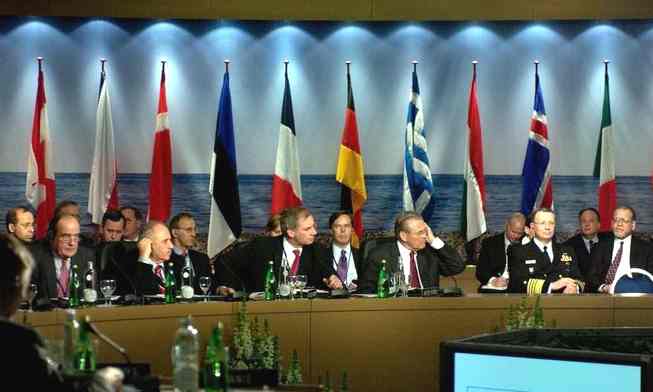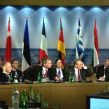
NATO OPENS A CRISIS SUMMIT IN BUCHAREST
Publication: Eurasia Daily Monitor Volume: 5 Issue: 62
By:

Heads of state and government of NATO member countries are convening today (April 2) in Bucharest for a three-day summit. The Alliance faces an unacknowledged, multidimensional crisis. The U.S. predicament in Iraq, troubled financial systems on both sides of the Atlantic, all-time-high energy prices, and growing European dependence on Russian energy, form the wider context to NATO’s own predicament.
The alliance’s crisis symptoms include: Russia casting an indirect veto, through Germany and France, against NATO Membership Action Plans (MAPs) for Ukraine and Georgia; the NATO-led International Assistance Force in Afghanistan (ISAF) deadlocked, with no apparent strategy for winning after six years of inconclusive operations there; and unfulfilled commitments to capability development and force generation, in spite of commitments announced at the last three summits.
Germany has campaigned against the Ukrainian and Georgian MAPs by citing a range of factors, mainly in deference to Russian concerns. Berlin singularized itself by playing that role openly ahead of the summit. However, several West European governments were known to sympathize with the Russo-German view to some degree and are endorsing it at the summit. While involving the MAP issue in an immediate sense, this debate goes to the heart of the alliance’s own decision-making processes, risking opening those processes to indirect Russian participation.
On arrival in Bucharest, French Prime Minister Francois Fillon declared: “We oppose Georgian and Ukrainian accession [to MAPs] because we believe that this is not the right answer in terms of balance of power in Europe and between Europe and Russia. We want to conduct a dialogue on this dossier with Russia. The President [Nicolas Sarkozy of France] will say these things in Bucharest” (Agence France Presse, Rompres, April 1).
The French intervention does far more than rescue Germany from singularization within NATO on this issue. Fillon’s statement practically abandons some basic NATO principles: indivisibility of North American and European strategies in the European theater, no voice for non-member countries (i.e., Russia) in the alliance’s deliberations, and performance-based assessment of aspirant countries by the allies. Instead, Fillon adduces a pre-1991, balance-of-power argument centered on Russia and obscuring the American factor in a Russia-Europe equation. And he practically invites – whether on behalf of France or a group of European allies – a Russian say in allied decisions.
Georgian President Mikheil Saakashvili is warning against “appeasement” of Russia by NATO. Saakashvili told summit participants via the Financial Times that denying the MAPs to Georgia and Ukraine would amount to granting Moscow a veto power over allied policy. Rewarding hardliners in Moscow would be a “dramatic mistake,” as “[a]ppeasement is seen there as a sign that they should act even more toughly, and they will become even more aggressive and provocative.” By the same token, “If we get MAPs, the aggressive elements [in Moscow] would back off” (Civil Georgia, April 1, 2).
U.S. President George W. Bush stopped over in Kyiv for meetings with President Viktor Yushchenko and Prime Minister Yulia Tymoshenko on April 1, en route to the Bucharest summit. “I strongly believe that Ukraine and Georgia should have their MAPs approved,” Bush declared at the news conference in Kyiv. Praising the Ukrainian top leaders’ “bold decision” to move toward the alliance, Bush assured his hosts that “Russia will not have a veto over what happens next.” However, he made clear that his endgame bilateral agenda with Russia covers far more goals than the Ukrainian and Georgian MAPs. This suggested to his hosts that the MAPs are not the utmost priority to the White House.
Emboldened by the German-French position, Russia is warning both the Alliance and the two aspirant countries. “Ukrainian movement toward [NATO] membership would trigger a deep crisis in Russia-Ukraine relations and would impact upon European security as a whole,” Grigory Karasin, State Seceratry of Russia’s Ministry of Foreign Affairs, warned (ITAR-TASS, April 1). The Minister, Sergei Lavrov, warned during an informal NATO-Russia ministerial meeting in Brussels that Georgia’s MAP aspirations could trigger incidents in Abkhazia or South Ossetia (ITAR-TASS, March 31). Few could doubt that Lavrov was implying that Russia might orchestrate such incidents through proxies so as to derail any prospect of approval for Georgia’s MAP.
Meanwhile NATO has maneuvered itself into the position of having to negotiate with Russia for transit of military supplies overland to Afghanistan. The alliance is requesting permission to open transit routes for military supplies from Europe to Afghanistan through Russia’s territory. Thus far, Moscow has only allowed France and Germany to resupply their own national contingents in Afghanistan via Russia.
The reasons behind NATO’s request to Russia are both practical and political. Some allies have concluded that the existing transit route to Afghanistan via Pakistan is no longer as reliable as was deemed these past six years. Some other allies feel that an agreement signed by NATO in its collective capacity with Russia could provide a rare political demonstration of NATO-Russia cooperation.
Moscow is setting political conditions for opening such transit for NATO via Russia and giving it a green light through Central Asian countries to Afghanistan. At a minimum, the Kremlin wants NATO to turn down the Ukrainian and Georgian MAPs. Putin had clearly implied this conditionality during his joint press conference with German Chancellor Angela Merkel in Moscow. On the same occasion Putin also implied that Russia would not sign a transit agreement directly with NATO, but would seek some international format other than NATO-Russia (Kremlin.ru, March 8).
With Germany and several other countries already blocking those two MAPs, Moscow may feel that it can pose some additional demands. Kremlin foreign policy consultant Vyacheslav Nikonov suggested this publicly: “Russia-NATO cooperation on Afghanistan could progress more extensively if NATO countries would take into account Russian concerns on a wide range of issues that are not confined to Ukraine and Georgia. At least six NATO countries are opposed to speeding up Ukraine’s and Georgia’s accession. To all appearances, no decision on these MAPs would be taken at this summit” (Interfax, March 30).
Moreover, the Duma’s foreign affairs committee chairman Konstantin Kosachev notes, “We know that the [NATO-ISAF] operation in Afghanistan is clearly failing and the situation is unfortunately deteriorating.” Thus Moscow is well placed to increase the price of its possible cooperation. Additional conditions could include political recognition by NATO of the Russia-led Collective Security Treaty Organization; and/or placing the NATO operation under the auspices of an international organization, such as the United Nations or OSCE, where Russia wields veto power (ITAR-TASS, March 29).




